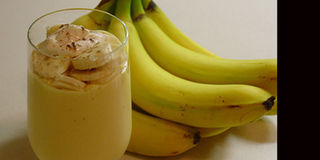Prime
Eat your way to a good sleep

It is advisable that one eats and drinks light food stuffs especially at night
This season, because of the partying and merry making, you might find that you are getting little sleep. Eunice Rukundo writes about the foods you need to eat to get you to sleep well and those you should avoid.
Food has the power to aid or harm your sleep. Julius Mulegi, a food scientist in private practice, explains that certain foods are high in tryptophan, the substance which the brain depends on to manufacture the sleep initiating serotonin. “There are however other foods which will instead stimulate your brain, making you alert. Like foods containing tyramine, a substance which increases the production of a brain stimulant called norepinephrine,” explains Mulegi.
Dr Moses Musooko, a general practitioner with IAA adds that other than the type of food consumed, it’s preparation, how and when it is eaten, could be another aspect that determines whether food impedes or aids one’s sleep.
In other words, when and how you eat, what you eat and in what quantities could have a lot to do with whether you sleep soundly or find trouble sleeping.
First, there are foods that will easily send you off to dream land and ensure peaceful sleep.
Drink your milk
A glass of warm milk with honey is highly rated for its magic to help you sleep soundly and prevent unnecessary waking. Dairy products, and honey, are among the foods that have amounts high of the sleep inducing substance tryptophan. Honey, oats, fish and poultry are some of the other high tryptophan-containing foods.
Indulge in carbohydrates
Complex carbohydrate foods such as bread and crackers also have a mild sleep-enhancing effect because they increase the production of the sleep promoting serotonin in the body. A perfect late night snack could therefore include a bowl of cereal and milk, yogurt and crackers, or bread and cheese, according to www.holisticonline.com/remedies/sleep.
Fruits
“Eat fruits like lemons and mulberries, because they help calm your mind,” explains Mulegi. Bananas, figs and dates too.
Lettuce and the green vegetables
Lettuce, that cabbage-like vegetable, also apparently has a long-standing reputation for promoting healthy sleep. www.holisticonline.com/remedies/sleep explains that lettuce has an opium-related substance that helps one sleep. So will the chlorophyll-rich foods, such as leafy, green vegetables, steamed or boiled.
Stock up on B3 containing foods
The food scientist explains that Vitamin B3 is involved in the processing of the sleep-aiding serotonin in the body, hence its importance in promoting healthy sleep. B3 containing foods include legumes like soybeans, peanuts, fish or poultry. These foods, according to the food scientist, contain vitamin B3 and hence promote healthy sleep. Mushrooms would also be a good addition to your evening meals.
To get you snoozing easily
For you who drops off to sleep by just considering the idea, it is easy to take dropping off to sleep for granted. Ask an insomniac however how problematic closing your eyes to sleep can be. While some foods will help you keep asleep and not wake unnecessarily, there are others that will help you fall asleep more easily. For this purpose, www.holisticonline.com/remedies/sleep recommends a high-carbohydrate snack, turkey, yogurt, milk, tuna, grapefruits and whole grain crackers for your evening meals.
The site also recommends a light snack before bedtime; just as long as it’s kept light and comprises the sleep aiding foods mentioned above.
Now, for the foods and habits that will harm your sleep.
High-protein foods in the hour or two before bed time are, according to Dr Musooko, not good because they are difficult to digest. Mulegi adds that protein rich food such as meat can also inhibit sleep by blocking the synthesis of serotonin and therefore making you more alert.
Forget the fat, chips and spices
They will only cause discomfort in form of heartburn or indigestion. Just like beans, cucumbers and peanuts, so steer clear or only reserve these for day time meals. “Fats, like proteins, are also not easily digestible,” adds Musooko.
Stop caffeine intake at noon
There is the obvious caffeine sources like coffee, but don’t forget about less obvious caffeine sources, like chocolate, cola, tea, soda and decaffeinated coffee. For better sleep, cut all caffeine from your diet after noon each day.
Alcohol may help you fall asleep faster but…
Even though it will send you off to snooze even before you intend to, alcohol doesn’t do much for your efforts to sleep comfortably. It for starters produces a number of sleep-impairing effects, frequent awakenings, less restful sleep, headaches, night sweats and nightmares. It also causes the release of adrenaline, and impairs the sleep aiding serotonin levels by disrupting the transport of tryptophan into the brain.
If you are consuming alcohol in the evening, www.holisticonline.com/remedies/sleep advises that you balance each drink with a glass of water to dilute the effects.
Sugar
And foods high in sugar and refined carbohydrates like white rice and flour, have a tendency to raise blood-sugar levels and can cause a burst of energy that disturbs sleep.
Spare yourself the food overload
A heavy meal will tax your digestive system, making you uncomfortable, as Dr Musooko explains, “Our digestive system slows at night, especially when we lie down to sleep. So, it is harder to digest late meals. Avoid many ingredients in a meal and heavy meals before bedtime,” cautions Dr. Musooko.
Cut the fluids by 8p.m
Great for your body as hydration may be, limit fluid intake before bed time or you are bound to spend your would be blissful hours of sleep between your bed and the bathroom.
There’s nothing like a relaxing smoke
While smoking may seem to have a calming effect, nicotine in tobacco and thus cigarettes, is actually a stimulant, with effects similar to caffeine and can cause sleep problems.
Other brain stimulants include bacon, cheese, chocolate, eggplant, ham, potatoes, sauerkraut, sugar, sausage, spinach, tomatoes, and wine.




